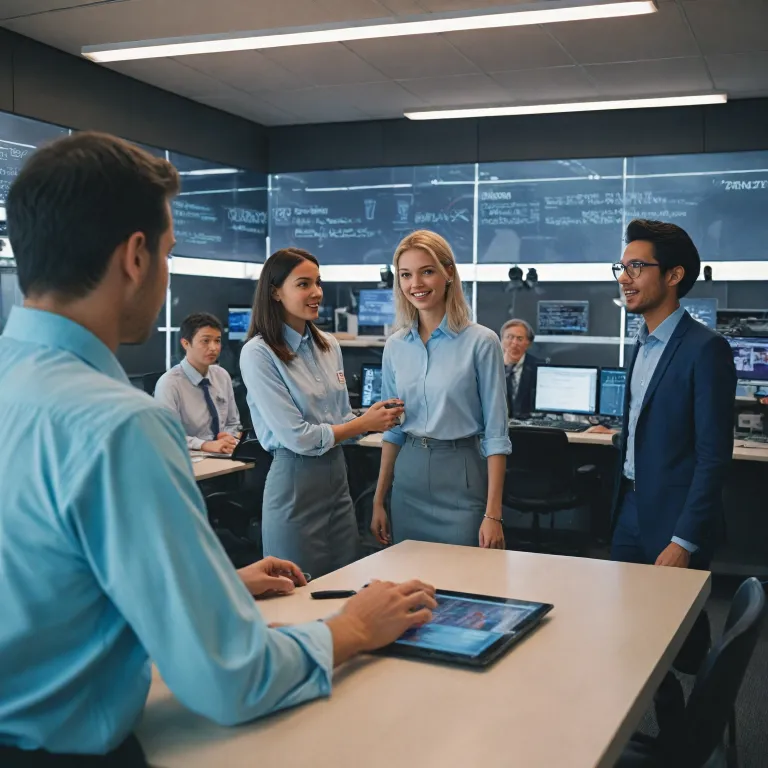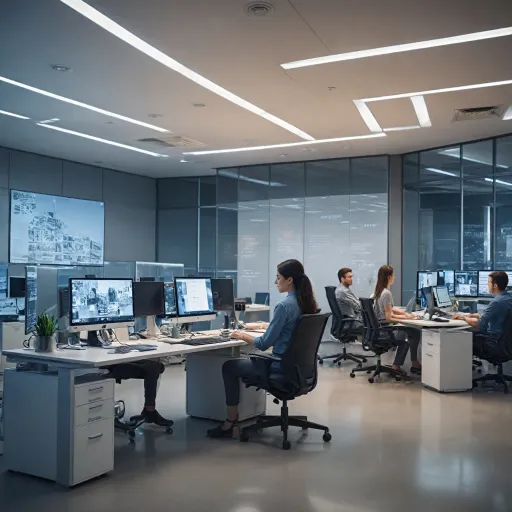
Understanding asynchronous interviews in modern recruitment
What makes async interviews different from traditional methods?
Asynchronous interviews, often called async interviews or asynchronous video interviews, are transforming the hiring process. Unlike traditional live interviews, where candidates and hiring managers meet in real time, async interviews allow candidates to record their responses to interview questions at their own pace. This approach uses interview software or platforms that enable candidates to complete pre recorded video interviews, usually within a set time frame.
In a typical async interview, candidates receive a list of pre defined interview questions through an interview platform. They then record their answers using video, audio, or text, depending on the software. These responses are later reviewed by recruiters or hiring managers, who can assess candidates without the need to coordinate schedules. This async process is particularly useful for high volume screening, where time and efficiency are critical.
Why are organizations turning to asynchronous video interviews?
The shift toward asynchronous interviews is driven by the need for flexibility and efficiency in the interview process. For candidates, async interviews offer the chance to showcase their skills and experience without the pressure of a live interview. For recruiters and hiring teams, asynchronous video interviews streamline the process, making it easier to compare responses and reduce scheduling conflicts.
- Async interviews allow candidates to record their responses at a convenient time, improving the overall candidate experience.
- Hiring managers can review pre recorded video interviews when it fits their schedule, enabling more thorough and consistent evaluations.
- Interview software often includes features for structured scoring and feedback, supporting best practices in candidate assessment.
Asynchronous interviews are not just about convenience. They also help organizations maintain a fair and consistent interview process, especially when dealing with a large number of applicants. For more insights on crafting effective interview questions for async interviews, you can read about key questions to ask candidates in video interviews.
As the hiring landscape evolves, async interviews are becoming a standard part of the recruitment toolkit. The next sections will explore how artificial intelligence is integrated into these platforms, the benefits and challenges of async interviews, and best practices for implementation.
The role of artificial intelligence in asynchronous interviews
How AI Powers Asynchronous Video Interviews
Artificial intelligence is reshaping the way asynchronous interviews work in the hiring process. Instead of relying on live, real time conversations, AI-driven interview platforms allow candidates to record responses to pre set interview questions at their own pace. This async interview process gives both candidates and hiring managers more flexibility, while also introducing new efficiencies and insights into recruitment.
Automated Screening and Analysis
One of the main advantages of using AI in asynchronous video interviews is the ability to automate the screening of high volume candidate pools. Interview software can analyze pre recorded video interviews, evaluating candidate responses based on criteria set by the hiring team. This includes assessing communication skills, relevant experience, and even soft skills, using natural language processing and video analysis tools. The async approach helps recruiters quickly identify top candidates without the need for live interviews at every stage.
Consistency and Fairness in Evaluation
AI brings consistency to the interview process by ensuring that every candidate receives the same set of interview questions and is evaluated using the same criteria. This reduces the risk of bias that can occur in traditional, live interviews. Asynchronous interview platforms can also flag potential issues or highlight strong responses, supporting hiring managers in making more informed decisions. However, it is important to recognize the pros cons of relying on AI, as discussed in navigating the challenges of specialist recruitment with AI.
Enhancing the Candidate Experience
AI-driven async interviews are designed to improve the candidate experience by allowing candidates to record their responses at a convenient time, reducing the stress of scheduling live interviews. Interview platforms often provide clear instructions and practice questions, helping candidates prepare and present their best selves. This flexibility can be especially valuable for candidates in different time zones or with busy schedules.
Integration with Recruitment Teams
For hiring teams, AI-powered asynchronous interview software streamlines collaboration. Team members can review candidate responses on their own time, share feedback within the platform, and make collective decisions more efficiently. This async workflow supports faster hiring cycles and better coordination among recruiters and hiring managers.
Benefits of using asynchronous interviews for candidates and recruiters
Enhancing Flexibility and Accessibility for Candidates
Asynchronous interviews, especially those powered by AI, offer candidates the flexibility to record their responses to interview questions at a time that suits them best. Unlike traditional live interviews, async interviews remove the pressure of scheduling conflicts and time zones. This is particularly beneficial for high volume hiring, where candidates may be applying from various locations. The async interview process allows candidates to present themselves in a comfortable environment, potentially improving their performance and overall candidate experience.
Streamlining the Screening Process for Recruiters
For hiring managers and recruitment teams, asynchronous video interviews simplify the screening process. Pre recorded video responses can be reviewed at any time, making it easier to compare candidates objectively. Interview software and platforms often include features that help recruiters organize, rate, and share candidate responses with the team. This async approach reduces the need for back-to-back live interviews, saving significant time and resources, especially during high volume hiring campaigns.
Consistency and Fairness in Evaluation
AI-driven asynchronous interview platforms can standardize interview questions, ensuring every candidate receives the same set of prompts. This consistency minimizes bias and helps maintain fairness throughout the interview process. The use of pre recorded video interviews also allows multiple hiring managers to review the same candidate responses, leading to more balanced hiring decisions.
Improving Employer Branding and Candidate Engagement
Offering asynchronous interviews demonstrates a commitment to modern, flexible hiring practices. This can enhance your employer brand, making your organization more attractive to top talent. For more on how employer branding transforms recruitment strategies, check out this in-depth guide on employer branding in recruitment. Additionally, async interview platforms often provide candidates with a user-friendly experience, allowing them to familiarize themselves with the process and reduce anxiety compared to real time interviews.
Pros and Cons for Both Sides
- Pros for candidates: Flexibility, reduced stress, and the ability to showcase their skills without the constraints of a live setting.
- Pros for recruiters: Efficient screening, easier collaboration, and improved consistency in evaluating responses.
- Cons: Some candidates may find async interviews impersonal, and there can be technical barriers for those unfamiliar with video interview software or platforms.
Overall, asynchronous interviews powered by AI are reshaping the hiring process, offering significant benefits for both candidates and recruiters. However, it is important to balance these advantages with thoughtful implementation and attention to candidate experience throughout the interview process.
Challenges and ethical considerations in AI-driven asynchronous interviews
Balancing Efficiency with Fairness in AI-Powered Interviews
AI-driven asynchronous interviews are transforming the hiring process, but they also introduce new challenges and ethical considerations. While asynchronous video interviews and interview software offer flexibility and scalability, it is crucial to ensure that candidates are treated fairly and that the process remains transparent.Potential Bias in Automated Screening
AI algorithms used in async interview platforms can unintentionally reinforce existing biases. For example, if the software is trained on historical data that reflects biased hiring practices, it may favor certain candidate profiles over others. This can affect how interview questions are evaluated or how responses are scored, impacting the overall candidate experience. Regular audits and diverse training data are essential to minimize bias in asynchronous interviews.Transparency and Candidate Consent
Candidates must understand how their pre recorded video responses will be used and evaluated. Clear communication about the interview process, including how AI will assess their answers, helps build trust. Providing information about the async interview platform and its evaluation criteria can improve the candidate experience and reduce anxiety around the technology.Data Privacy and Security Concerns
Asynchronous video interviews require candidates to record and upload personal information, including video and audio data. Organizations must ensure that interview platforms comply with data protection regulations and that candidate data is stored securely. Limiting access to candidate responses and using encrypted storage are best practices for protecting sensitive information during the hiring process.Accessibility and Equal Opportunity
Not all candidates have equal access to the technology required for asynchronous interviews. Issues such as unreliable internet connections, lack of suitable devices, or unfamiliarity with video interview software can disadvantage some applicants. To promote equal opportunity, hiring managers should offer alternative interview formats or provide support to candidates who face technical barriers.Human Oversight and the Role of the Hiring Team
While AI can streamline high volume screening and pre recorded interview analysis, human involvement remains critical. Hiring managers and recruiters should review AI-generated recommendations and ensure that final decisions are not made solely by algorithms. This helps maintain accountability and ensures that the interview process remains fair and inclusive for all candidates.- Regularly review and update AI models to reduce bias
- Communicate clearly with candidates about the async interview process
- Ensure data privacy and security in all interview platforms
- Provide alternatives for candidates with limited access to technology
- Maintain human oversight throughout the hiring process
Best practices for implementing asynchronous interviews with AI
Setting up your async interview platform for success
Choosing the right asynchronous interview software is the first step. Look for platforms that support pre recorded video interviews, flexible interview questions, and easy integration with your existing hiring process. Make sure the software allows candidates to record responses at their convenience, which improves the candidate experience and accommodates different time zones.Crafting clear and fair interview questions
When designing questions for async interviews, clarity is key. Avoid ambiguous or overly complex questions. Instead, focus on structured prompts that allow candidates to showcase their skills and experience. Use a mix of behavioral and situational questions to get a well-rounded view of each candidate. Pre recorded questions help ensure consistency across all interviews, which is especially important for high volume screening.Ensuring a positive candidate experience
Communicate expectations early. Let candidates know how the asynchronous video interview process works, what technology is required, and how much time they’ll need. Offer practice questions or demo videos so candidates can get comfortable with the platform. Timely feedback and clear next steps help maintain engagement, even in an async process.Training your hiring team and standardizing evaluation
Train hiring managers and interviewers on how to review video responses objectively. Use standardized evaluation criteria to reduce bias and ensure fairness. Many interview platforms offer built-in scoring rubrics, which can help teams align on what makes a strong response. Regular calibration meetings can further improve consistency in the interview process.Balancing automation with human oversight
AI-driven asynchronous interviews can streamline screening, but human judgment remains crucial. Use AI to handle high volume tasks like flagging incomplete responses or ranking candidates based on keywords. However, always have a team member review final decisions to account for context and nuance that software might miss. This balance helps avoid the pros cons of relying solely on automation.Protecting candidate data and ensuring compliance
Safeguard candidate privacy by choosing interview platforms that comply with data protection regulations. Be transparent about how video interviews are stored and used. Limit access to candidate responses to only those involved in the hiring process, and set clear data retention policies.- Choose user-friendly async interview software
- Write clear, unbiased interview questions
- Communicate process and expectations to candidates
- Train hiring managers on fair evaluation
- Use AI for efficiency, but keep human oversight
- Prioritize data privacy and compliance
Future trends in asynchronous interviews and AI for human resources
Emerging Technologies Shaping Async Interviews
Asynchronous interviews are evolving rapidly, with new technologies making the process more efficient and insightful for both candidates and hiring managers. Advanced interview software now leverages AI to analyze video interviews, assess candidate responses, and even detect soft skills through facial expressions and voice patterns. These tools are becoming more accessible, allowing teams to screen high volume applicants with greater accuracy and less bias.
Personalization and Candidate Experience
One of the most promising trends is the shift toward personalized async interview experiences. Platforms are starting to adapt interview questions based on candidate profiles, previous responses, and job requirements. This tailored approach not only improves the candidate experience but also helps recruiters gather more relevant information during the pre recorded interview process. Asynchronous video interviews are moving away from generic, one-size-fits-all formats to more dynamic and engaging interactions.
Integration with Broader Hiring Platforms
Async interview tools are increasingly being integrated with larger hiring platforms, making it easier for teams to manage the entire hiring process from screening to final selection. This integration streamlines workflows, reduces manual effort, and ensures that candidate data is easily accessible throughout the interview process. Hiring managers can now review candidate responses, compare performance across different stages, and collaborate with their team in real time, even when interviews are conducted asynchronously.
AI-Driven Insights and Fairness
AI is not just automating the screening process; it is also providing deeper insights into candidate potential. By analyzing large volumes of video interviews, AI can identify patterns that might be missed in live interviews. However, there is a growing focus on ensuring that these algorithms are transparent and fair. Organizations are investing in ethical AI practices to minimize bias and ensure that async interviews provide equal opportunities for all candidates.
Pros, Cons, and the Road Ahead
- Pros: Async interviews save time, allow candidates to record responses at their convenience, and help recruiters handle high volume hiring efficiently.
- Cons: Some candidates may find pre recorded video interviews less personal, and there are ongoing concerns about the accuracy and fairness of AI-driven assessments.
Looking forward, the async interview landscape will likely see more sophisticated candidate screening, improved interview platforms, and a stronger emphasis on candidate experience. As organizations continue to adopt best practices and address ethical challenges, asynchronous interviews powered by AI will become a standard part of the modern hiring process.












